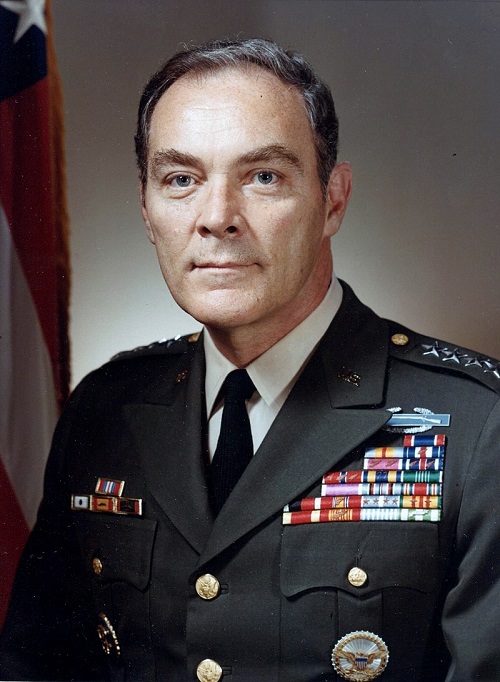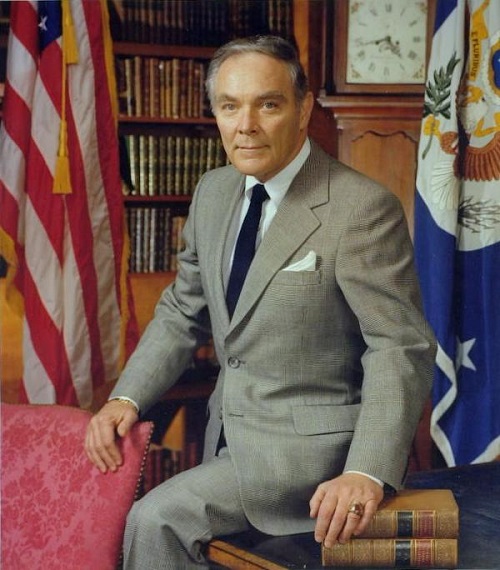Alexander Haig
The youngest four-star general in the U.S. Army’s history.
“I’m the only American alive or dead who presided unhappily
over the removal of a vice president and a president.”
Alexander Haig
I was driving my taxi in the Upper East Side of Manhattan, when a man and a woman flagged me. As I approached the couple, I realized the man was Alexander Haig. Immediately, I felt bad energy, but kept a smiling poker face on. They both got in, and Alexander said, take us to McMullen’s. He quickly followed up in a sly and condensing tone when he asked me, do you know where that is? I smiled and said, yes, I know where Jim McMullen’s restaurant is.
During the ride, I felt a strange darkness emanating from him I had never felt before while driving any passenger. He knew that I sensed this through my smiling poker face. It was as if there was telepathy between us. Many times I almost gave him a piece of my mind but acted professionally. What I received back from him was akin to the Jack Nicholson character in A Few Good Men; from the scene, you can’t handle the truth.
None too soon, we were at McMullen’s. His wife got out and promptly started to look back into the taxi. I turned around and looked back as Alexander Haig was about to hand me three dollars for the fare. He put it close to my hand, looked me in the eye for two or three seconds, and then dropped the three-dollar bills on the rear floor.
His wife Patricia, who was looking at this power play, to my utter astonishment, said in a loud and reprimanding voice, Alexander, pick that up. I couldn’t believe that he did what he did to me, but even more so, I couldn’t believe that his wife not only caught him doing this but also verbally admonished him for doing so.
Alexander Haig was caught red-handed being wickedly arrogant. So, he had to reach down to the floor, pick up the three dollars, and hand them to me. As he did, I had the biggest smile on my face, and momentarily hesitated to prolong this wonderful moment before I let the exchange finally be made.
Here was one of the most powerful men in the world, forced to do the right thing by his legitimately disdainful wife. He wasn’t a happy boy. Through our telepathy, I said, miracles like this can and do happen, and in the end, love will triumph.
Biographies of the Secretaries of State: Alexander Meigs Haig Jr.
Born and raised in Philadelphia, Haig attended the University of Notre Dame before transferring to the United States Military Academy at West Point. After graduating from the Academy in 1947, he embarked on a long and successful career in the military, serving with distinction in both Korea and in Vietnam. Upon completing graduate studies at Georgetown University in 1962, he worked at the Pentagon under both Secretary of the Army Cyrus Vance and Secretary of Defense Robert McNamara. In 1969 he became military adviser to Henry Kissinger, and then Deputy Assistant to the President for National Security in 1971. He served as Chief of Staff for Presidents Richard Nixon and Gerald Ford in 1973-74, and then became Supreme Allied Commander in Europe in 1974, a position that he held until he resigned on January 3, 1979. After two years in the private sector, he returned to government service when President Reagan selected him to be Secretary of State.
https://history.state.gov/departmenthistory/people/haig-alexander-meigs
Two Things About Al Haig That Are Not In His Obituary
Columnist Wayne Madsen takes us behind the scenes of two momentous events in recent US history where General Alexander Haig played a pivotal role by twice foiling an attempt against the constitutional order. First, during the Watergate scandal when Haig anticipated that Richard Nixon might mobilize the military to hold on to power. Then, as Ronald Reagan’s Secretary of State, when Haig did not fall for the official story of the assassination attempt, pinned on an allegedly love-sick young man whose father just happened to have very close links with Vice-President George H.W. Bush.
by Wayne Madsen
https://www.voltairenet.org/article164191.html
Alexander Haig’s Fall From Grace
A Moment In U.S. Diplomatic History
A highly decorated military leader and influential political figure, Alexander Haig’s career, which included such roles as Supreme Allied Commander to Europe (SACEUR) and Chief of Staff to Presidents Gerald Ford and Richard Nixon, culminated with his appointment as President Ronald Reagan’s Secretary of State on January 22, 1981. As White House staff and Department of State personnel quickly discovered, however, Haig’s wealth of experience did not prepare him for smooth sailing in Washington or abroad.
by Association for Diplomatic Studies and Training (ADST)
https://adst.org/2016/06/alexander-haigs-fall-grace
Alexander Haig
Alexander Meigs Haig Jr. (December 2, 1924 – February 20, 2010) was United States Secretary of State under President Ronald Reagan and White House Chief of Staff under Presidents Richard Nixon and Gerald Ford. Prior to and in between these cabinet-level positions, he was a general in the United States Army, serving first as the vice chief of staff of the Army and then as Supreme Allied Commander Europe. In 1973, Haig became the youngest four-star general in the U.S. Army’s history. Haig ran unsuccessfully for the 1988 Republican Party presidential nomination.
https://en.wikipedia.org/wiki/Alexander_Haig
I’m In Control Here (0:46)
Historical Segment Of The Press Conference That Alexander Haig Gave On March 30, 1981, After The Attempted Assassination Of President Ronald Reagan
On March 30, 1981, the son of John W. Hinckley, Sr. a close family friend and Midland, Texas oil industry associate of Vice President George H W Bush, John W. Hinckley, Jr., shot and seriously wounded President Ronald Reagan as he left the Washington Hilton hotel. Bush was sitting in Air Force Two in Austin, Texas with Texas Republican Governor Bill Clements, a close Bush ally. Furthermore, Hinckley Jr.’s brother Scott Hinckley was to have dinner with Bush’s son Neil Bush the day after the assassination. Neil was living at the time in Denver, where the Hinckleys had moved from Texas, and was working for AMOCO. Scott Hinckley was a Vice President for his father’s Vanderbilt Energy. The friendship mirrored that between John Hinckley, Sr. and George H. W. Bush. Bush’s Zapata Oil reportedly bailed out Vanderbilt Energy when it fell on hard times in the 1960s. Hinckley Sr. also served as president of the Christian evangelist organization World Vision, believed to be a major CIA conduit for operations in Third World countries.
https://www.youtube.com/watch?v=zUKW0fL-OqY
A Few Good Man “You Can’t Handle The Truth” (1:50)
Jack Nicholson as Colonel Nathan R. Jessep, Addresses the Court on “Code Red”
https://www.youtube.com/watch?v=5j2F4VcBmeo
Alexander Haig
That’s not a lie, it’s a terminological inexactitude.
Alexander Haig defending himself against accusations of lying in 1983. Quoted by Rutledge, Leigh W., “Would I Lie To You?”, Plume, 1998, ISBN 0-452-27931-3, p. 81.
This turn of phrase originated with Winston Churchill in his 1906 election campaign.
https://en.wikiquote.org/wiki/Alexander_Haig
“That’s not a lie, it’s a terminological inexactitude.”
Alexander Haig
Subscribe To The MeetingsAndStories.com Newsletter
https://MeetingsAndStories.com/Subscribe
Support My Book Meeting and Stories
https://MeetingsAndStories.com/Donate
Meetings and Stories
The Wondrous Journey of My Life
by Mark R. Elsis
https://MeetingsAndStories.com



Just another brainwashed warhead who wants to rule the world. militant, as most Generals are. The rank went to his head like MacArthur, Patton.